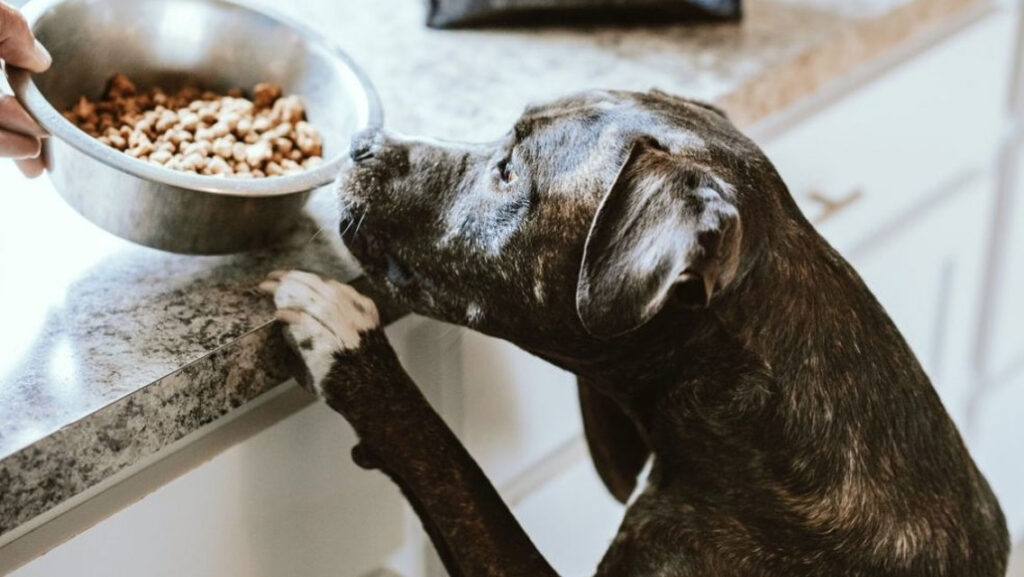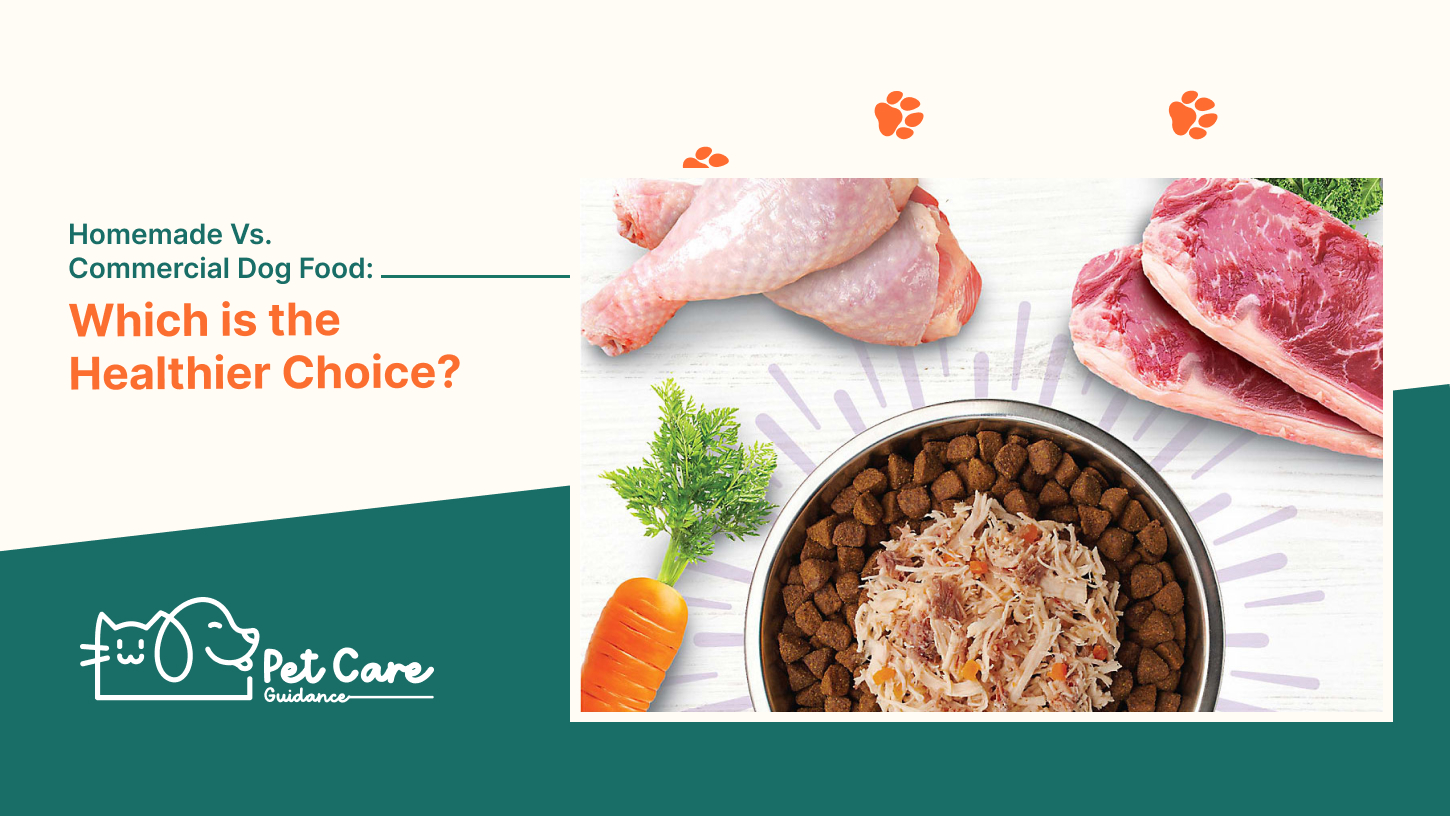When it comes to choosing between homemade and commercial dog food, the healthier choice depends on whether the pet’s nutritional needs are fully met. While homemade food can offer a variety of flavors and nutrients, it often lacks essential nutrients.
On the other hand, commercial dog food is formulated to be complete and balanced, although it may contain unnecessary additives and preservatives. The decision between homemade and commercial dog food should be made based on the individual pet’s needs, with consultation from a veterinary nutritionist to ensure optimal health and well-being.
Potential Benefits Of Homemade Dog Food
When it comes to choosing between homemade and commercial dog food, there are potential benefits to homemade options. One advantage is increased control over the ingredients used. With homemade dog food, you have the ability to choose high-quality ingredients and avoid fillers or additives that may be present in commercial options.
Another benefit is the ability to customize the food to your dog’s specific needs, such as addressing food allergies or sensitivities. Homemade dog food can also offer enhanced nutritional value, as you can ensure that your dog is getting a balanced diet with all the necessary nutrients.
Potential Drawbacks Of Homemade Dog Food
| Difficulties in achieving balanced nutrition |
| Time-consuming preparation and planning |
| Risk of contamination or improper storage |
Homemade dog food can have potential drawbacks that dog owners should be aware of. One challenge is achieving balanced nutrition. It can be difficult to ensure that homemade meals provide all the necessary nutrients that dogs need, such as vitamins, minerals, and essential fatty acids.
Another drawback is the time-consuming nature of preparing and planning homemade dog food. It requires research, recipe development, and regular grocery shopping to provide a well-rounded diet for your pet.
Additionally, homemade dog food may carry a risk of contamination or improper storage. Raw or undercooked ingredients can harbor harmful bacteria that may be harmful to your dog’s health if not handled and stored properly.
Considering these potential drawbacks, it’s important for dog owners to carefully weigh the pros and cons of homemade dog food before deciding if it’s the right choice for their furry friends.
Homemade Vs. Commercial Dog Food: Which is the Healthier Choice?
When it comes to convenience and ease of use, commercial dog food has a clear advantage. It eliminates the need for pet owners to spend time and effort preparing homemade meals daily. With commercial pet food, all that is required is to open a can or scoop out the appropriate amount from a bag. This makes feeding your furry friend a hassle-free task, especially for busy pet owners.
Furthermore, reputable commercial dog food brands assure balanced nutrition. These brands have a team of expert veterinarians and animal nutritionists who carefully formulate their recipes to meet all the necessary nutritional requirements for dogs. They conduct rigorous testing and quality control measures to ensure that every bag or can of commercial dog food provides the right balance of proteins, carbohydrates, fats, vitamins, and minerals.
Another benefit of commercial dog food is the availability of specialized formulas. Whether your dog has specific dietary needs or health conditions, there are commercial options designed to address these concerns. For example, you can find dog food tailored for puppies, senior dogs, dogs with food allergies, or dogs with sensitive stomachs. These specialized formulas take the guesswork out of providing the right nutrition for your furry companion.

Potential Drawbacks Of Commercial Dog Food
|
Homemade dog food offers many potential benefits, including the use of higher-quality ingredients, minimal processing, and fewer additives. However, it is important to consider the potential drawbacks of commercial dog food as well. One major drawback is the use of lower-quality ingredients in some commercial brands.
|
Important Nutrients For Dog Health
When it comes to the health of your dog, it’s important to provide them with the right nutrients. Here are the key nutrients that contribute to a dog’s overall health:
| Protein: | Protein is essential for dogs as it helps with muscle development, growth, and repair. Good sources of protein for dogs include lean meats, fish, eggs, and dairy products. |
| Carbohydrates: | Carbohydrates provide energy for dogs. Good sources of carbohydrates include whole grains, vegetables, and fruits. It’s important to choose complex carbohydrates over simple sugars. |
| Fats: | Fats are important for dogs as they provide energy, help absorb vitamins, and support a healthy coat and skin. Good sources of fats for dogs include fish oil, chicken fat, and flaxseed. |
| Vitamins and minerals: | Vitamins and minerals are necessary for a dog’s overall health and well-being. They help support the immune system, promote healthy bones and teeth, and aid in digestion. Good sources of vitamins and minerals for dogs include fruits, vegetables, and supplements. |
Providing your dog with a balanced diet that includes the right amounts of protein, carbohydrates, fats, and vitamins and minerals is essential for their overall health. Whether you choose homemade or commercial dog food, make sure it meets your dog’s nutritional needs.
Evaluating Homemade Dog Food Recipes
|
When it comes to evaluating homemade dog food recipes, there are a few important factors to consider. Consulting with a veterinary nutritionist can be incredibly beneficial in ensuring you are providing a well-balanced and nutritious diet for your furry friend. They can help you select appropriate protein sources and guide you on incorporating essential vitamins and minerals.
|
Tips For Preparing Homemade Dog Food
| Properly cooking and handling ingredients |
| Ensuring a balanced and varied diet |
| Gradual transition from commercial to homemade food |
Properly cooking and handling ingredients is crucial when preparing homemade dog food. Make sure to thoroughly cook all meats and vegetables to eliminate any potential bacteria. It’s also important to properly store and handle raw ingredients to prevent contamination.
When preparing homemade dog food, it’s essential to ensure a balanced and varied diet. Include a variety of protein sources, such as lean meats or fish, and incorporate different types of fruits and vegetables. This provides your dog with a wide range of nutrients and helps prevent nutritional deficiencies.
If you’re transitioning your dog from commercial to homemade food, it’s best to do it gradually. Start by mixing in a small amount of homemade food with the commercial food and gradually increase the ratio over time. This allows your dog’s digestive system to adjust and minimizes any potential gastrointestinal upset.
By following these tips, you can ensure that your homemade dog food is healthy and provides your furry friend with the nutrition they need.

Choosing The Right Commercial Dog Food
| Reading and understanding ingredient labels |
|
When choosing a commercial dog food, it’s important to read and understand the ingredient labels. Look for high-quality, whole food ingredients like chicken, beef, or fish listed as the first few ingredients.
|
| Avoiding common fillers and additives |
|
Common fillers and additives found in commercial dog food can be detrimental to your dog’s overall health. Ingredients like corn, soy, and artificial colors should be avoided as they can cause allergies, digestive issues, and potential long-term health problems. Look for natural dog food options that are free from these fillers and additives. |
| Considering special dietary needs (e.g., allergies, sensitivities) |
|
If your dog has special dietary needs, such as allergies or sensitivities, it’s essential to choose a commercial dog food that caters to these requirements. Look for specific formulas that address these issues, such as limited ingredient diets or grain-free options.Consulting with a veterinarian can also help determine the best food for your dog’s individual needs. |
Transitioning Between Homemade And Commercial Dog Food
Transitioning your dog between homemade and commercial food should be done gradually to avoid any digestive upsets. Start by introducing small amounts of the new food while gradually decreasing the old food. This can be done over a period of about 7-10 days.
Monitor your dog’s response to the new food, looking for any signs of discomfort or allergies. If your dog experiences any negative reactions, such as loose stools or vomiting, it may be necessary to adjust the proportions or try a different brand of commercial food.
It’s always a good idea to seek guidance from a veterinarian to ensure you are providing a balanced and nutritious diet for your dog. They can offer personalized recommendations based on your dog’s specific needs.
Frequently Asked Questions For Homemade Vs. Commercial Dog Food: Which Is The Healthier Choice?
Is Homemade Dog Food Healthier Than Store Bought?
Homemade dog food may not always be healthier than store-bought. It’s important to ensure homemade meals meet your pet’s nutritional needs. Consulting a veterinary nutritionist is recommended to ensure a balanced diet.
Is It Healthy For Dogs To Eat Homemade Dog Food?
Homemade dog food can be healthy for dogs as long as their nutritional needs are met. It is recommended to consult with a board-certified veterinary nutritionist for proper recipes and guidance. Homemade food offers a variety of flavors and nutrients that may not be found in commercial dog food.
Is It Cheaper And Healthier To Make Your Own Dog Food?
Making your own dog food can be cheaper and healthier as it allows you to use fresh ingredients and avoid additives and preservatives found in commercial dog food. Additionally, homemade food offers more variety and customization based on your dog’s preferences.
Is Home Cooked Dog Food Better For Dogs?
Home cooked dog food offers a variety of flavors, textures, vitamins, and nutrients that may not be found in commercial dog food. While both can meet a dog’s nutritional needs, homemade food allows for more control over ingredients.
Conclusion
When deciding between homemade and commercial dog food, it’s important to prioritize the nutritional needs of your pet. While homemade food can offer a variety of flavors and textures, it may lack essential nutrients if not carefully formulated. On the other hand, commercial dog food is designed to be balanced and complete, although it may contain additives.
Ultimately, consulting with a veterinarian or veterinary nutritionist is crucial in ensuring the health and well-being of your furry friend.


